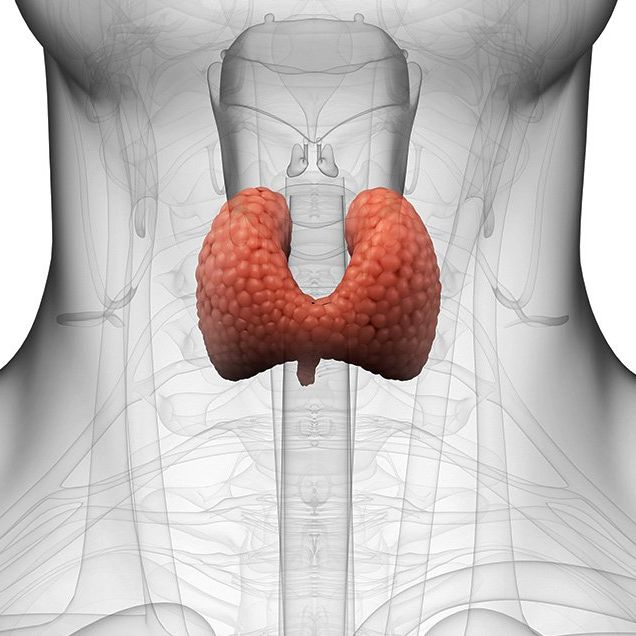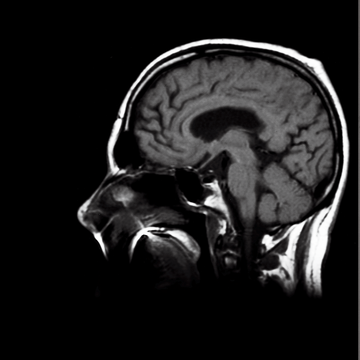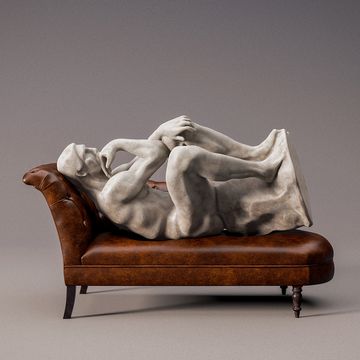When I was 22 years old, I was eating healthy and working out five days a week—and I still put on 50 pounds in a six-month period.
Weight gain is one of the telltale symptoms of hypothyroidism, or underactive thyroid, a condition that occurs when your thyroid gland doesn’t produce enough of some important hormones. Because it’s more common in women, my then-boyfriend suggested I head to my doctor to get it checked out.
I did, and my doctor diagnosed me with hypothyroidism, which I’ve controlled with a daily regimen of medication.
Then, nearly 20 years later, my now-husband found himself growing frustrated with a whole batch of seemingly unconnected symptoms: two tiny bald spots, one on his beard and the other on the side of his head, dry skin, and the gut that he couldn’t shake despite working out five days a week—including three double sessions.
He thought his testosterone levels were to blame, but tests for T checked out just fine. It was another test that showed the answer—it was a thyroid problem.
More specifically, his results indicated Hashimoto’s disease, an autoimmune condition where your own immune system attacks your thyroid gland and damages it, resulting in symptoms of hypothyroidism.
Hypothyroidism is different from hyperthyroidism, or an overactive thyroid, which occurs when your gland produces too much of the thyroid hormone. As a result, with overactive thyroid, guys can experience symptoms like weight loss, heart palpitations, anxiety, tremors, hair loss, and elevated testosterone levels.
Both kinds of thyroid issues are more common in women than men. In fact, according to Deena Adimoolam, M.D., spokesperson for Endocrine Society's Hormone Health Network, men are guys are five to eight times less likely than women to have thyroid problems.
But that doesn’t mean men are in the clear—as my husband’s case proven, guys can get it too. And as Dr. Adimoolam says, it’s possible that men are under-diagnosed, since they tend to go to the doctor less than women.
Your move? Familiarize yourself with the signs of an underactive thyroid. Check out these 9 signs of hypothyroidism in men below, and if any seem familiar, make an appointment with your doctor.
Underactive thyroid sign: You gain weight
It’s no surprise that this was one of the first signs that showed up for both my husband and myself. Hypothyroidism causes a generalized slowing of your body’s metabolic processes, which directly affect your ability to lose weight—and makes it easier to pack on the pounds.
This is why my husband was working twice as hard to maintain his current weight, when his regular exercise routine used to be enough to easily lose a few pounds and lose that gut.
There’s no real set amount of weight can you can see with an underactive thyroid, but the more severe your hypothyroidism is, the more weight you can gain, says Dr. Adimoolam.
Related: The 21-Day Metashred From Men's Health—an At-Home Workout Plan That Fries Fat Fast
Underactive thyroid sign: You feel cold all the time
It used to be your girlfriend who was constantly upping the heat in your home. But if your thyroid isn’t producing enough hormones, you may start to feel more sensitive to the cold.
“Thyroid hormone basically runs the body’s furnace,” Leonard Wartofsky, M.D., a professor of medicine at Georgetown University’s School of Medicine and past president of both the Endocrine Society and the American Thyroid Association. “It is what generates heat and burns calories with our metabolism.”
Heat is produced as a byproduct of your body breaking down food. So if your furnace is not running up to par, you’re not burning as many calories—meaning you’re not producing as much heat, either.
“It’s not just that they feel cold,” Dr. Wartofsky says. “They are cold. Normal body temperature is 98.6 degrees, but instead, a hypothyroid patient could have a body temperature of 97.6.”
Related: Does Cold Weather Really Make You Sick?
Underactive thyroid sign: Your mood is off
Physical symptoms aren’t the only signs to watch out for. The slowing of your metabolism with can affect your cognition, too, which can result in symptoms of depression, loss of ambition, and even forgetfulness or issues with memory or alertness.
The mechanism behind hypothyroidism and its affects on your brain aren’t exactly clear, says Dr. Adimoolam, but studies have given us a couple theories as to what can be driving the relationship. It’s possible that hypothyroidism can lead to decreased blood flow in the brain, potentially causing cognition issues.
The science is much clearer on depression and hypothyroidism. Your body’s adrenal glands, located at the top of each kidney, produce hormones we can’t live without, including sex hormones and cortisol—the infamous stress hormone.
“The adrenal steroid gland is what we depend on for energy,” Dr. Wartofsky says. “When your adrenal glands are hypothyroid, so to speak, they are sluggish. You get low levels of energy, your brain function is low, your body temperature is low, and there is a tendency for depression.”
Just like weight gain, the more severe your hypothyroidism, the more pronounced the effects on depression can be, says Dr. Wartofsky.
A 2015 study from Germany of over 2,100 people found that those with untreated hypothyroidism scored significantly higher on a scale that measured depression. They were also more likely to have symptoms of anxiety, too. And this 2011 Italian study on depressive symptoms in hypothyroid patients found the prevalence to be a whopping 64 percent.
Related: 7 Surprising Signs Of Depression In Men
Underactive thyroid sign: Your skin is dry
Hallmarks of an underactive thyroid include dry, rough, cool, and even pale skin. That’s what my husband experienced, and the itch that comes with that dry skin could be unbearable at times.
“This is partially due to decreased blood flow and a slower turnover of skin cells,” says Izabella Wentz, Pharm.D., licensed pharmacist and author of Hashimoto’s Protocol: A 90-Day Plan for Reversing Thyroid Symptoms and Getting Your Life Back. “Patients often see a reduction in sweating, as the body’s metabolic fat burning is turned off.”
So why does this happen? The short answer is that lower levels of thyroid hormones compromise your sweat glands and causes a glitch in the skin’s growth and replacement cycle. This is why guys with Hashimoto’s disease and hypothyroidism end up with peeling, cracking, and flaking skin. Moisturizer can help, but not eliminate, the problem.
But don’t go running to your doctor in a panic at the first sign of dry skin, warns Dr. Adimoolam.
“It is important to recognize dry skin as one symptom of hypothyroidism,” she says. “Men should be aware of all symptoms and look at the whole. When one has dry skin along with other symptoms of hypothyroidism, that is when one should go and see their doctor.”
Related: 6 Cheap Moisturizers That Will Make Your Face Look Younger
Underactive thyroid sign: You can’t poop
Hypothyroidism results in decreased gut motility, or a slowing of the gut contractions that help move your waste through your digestive tract and out of your body.
As the contractions—called peristalsis—slow, your body has more time to reabsorb water from the stool your system hasn’t passed yet, making it harder in the process, says Dr. Adimoolam.
Slowing gut contractions can result in constipation. You may also end up having a harder time pooping simply because your stool is harder than it should be.
Related: 10 Reasons You Just Can't Poop
Underactive thyroid sign: Your muscles cramp
Muscle cramps are never fun to deal with, and if you have an underactive thyroid, the chances are you’ll be dealing with them more often.
“Muscular skeletal symptoms can occur in men,” says Dr. Adimoolam. “Symptoms can include weakness, cramps, and muscle pain.”
Increased levels of an enzyme called creatine kinase may be to blame, she adds.
Related: How to Stop a Charley Horse In the Middle of the Night
Underactive thyroid sign: Your sex life suffers
For guys, hypothyroidism is associated with low libido, erectile dysfunction—the inability to get and keep an erection firm enough for sex—and possibly premature or delayed ejaculation.
There’s a lot of misinformation out there blaming low levels of T as being the reason, but Dr. Adimoolam says that’s just not the case. Low T levels, she adds, are rarely seen with hypothyroidism in men (Here are 8 sneaky signs your testosterone is too low).
So, if low levels of T aren’t behind the dip in the action between the sheets, what is?
“It’s all about brain function and energy level, and an overall sense of wellbeing. If you feel lousy, all you want to do is lie down and feel better. You’re just not going to be that interested in sex,” says Dr. Wartofsky.
“It’s kind of like depression,” he explains. “You just feel lousy. Testosterone is not the only thing governing your interests.”
6 Things Every Man Should Know About His Penis:
Underactive thyroid sign: You have trouble growing facial hair
My husband is in no danger of going bald anytime soon, but he now understands that the seemingly random bald spot in his beard—along with the one he noticed on the side of his head—is a result of Hashimoto’s.
“Hair may be coarse, hair loss is common, and the nails become brittle due to slower turnover of cells, reduced blood flow and access to nutrients,” Wentz says, noting that hair loss specific to the outer third area of the eyebrow is reason enough to warrant a visit to your physician.
Thinning hair, or difficulty growing it, is more common in hypothyroidism than in those with overactive thyroids, says Dr. Adimoolam.
“In order for hair to be maintained, you need to have a balance between hair rest and hair growth,” She says. “ In hypothyroidism, you get an imbalance leading to thinning hair.”
Related: The Best Haircuts For Men With Thinning Hair
Underactive thyroid sign: You have a relative with a thyroid condition
Thyroid conditions have a genetic component, especially when talking about Hashimoto’s disease, and a parent with thyroid condition can raise your risk of having one, too.
Generally speaking, the parent with the thyroid condition will most likely be your mother because women are more likely to suffer from autoimmune conditions, says Dr. Adimoolam.
“If a man has a family history it is important to be aware of symptoms of thyroid disease so you can be screened earlier,” she says, adding that all you need is a simple blood test.
Related: 6 Essential Blood Tests You Should Have
Bottom line on thyroid disease
Don’t panic if you just have dry skin or are dealing with thinning hair. It’s the presence of multiple symptoms of underactive thyroid that should warrant concern and a doctor’s appointment, says Dr. Adimoolam.
If you suspect an underactive thyroid, say so when you make the appointment, and specifically request a blood test to measure your body’s thyroid hormone levels.
The good news is, if you are diagnosed with hypothyroidism, the condition is treatable with thyroid hormone replacement medication, which replace the thyroid hormone you body can no longer produce on its own.
And when you treat your thyroid, the symptoms should improve, says Dr. Adimoolam.













